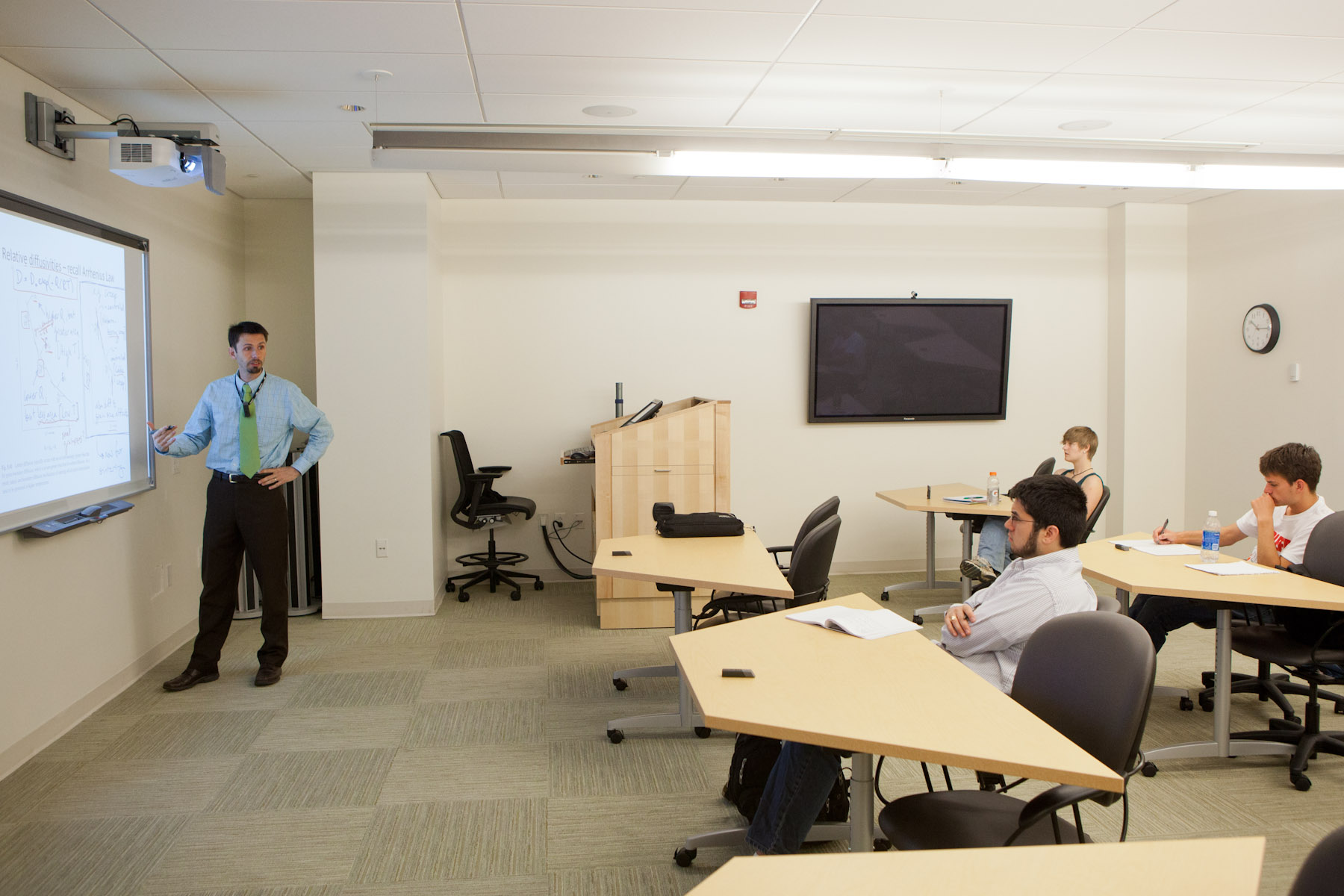April 4, 2012 — If you were to ask someone where the University of Virginia is located, most would answer "Charlottesville." But there are a number of places and programs throughout Virginia where students can attend U.Va. classes and earn U.Va. degrees - and one of those programs will produce its first crop of engineers in May.
The first eight graduates of Engineers PRODUCED in Virginia, a distance-learning initiative that links remote students into classes at U.Va.'s School of Engineering and Applied Science in real time, will walk down the Lawn this May to receive their bachelor's degrees in engineering, with concentrations in materials science. The majority have already secured jobs in their respective towns.
PRODUCED "home-grows" engineers to meet the needs of companies based in rural Virginia that formerly have spent significant amounts of money to recruit engineers both regionally and nationally, according to James Groves, assistant dean of engineering, who directs PRODUCED. However, many of those recruits only stayed in Virginia a few years because they were unable to connect with the local community and lifestyle. This inability to recruit engineering talent severely limited these companies' ability to expand, he explained.
"If we can educate people from the community, connect them with well-paid jobs in the community, they will stay in the local community," he said.
Greg Pence, manager of engineering applications at Flowserve USA Inc., reiterated the difficulty Flowserve faces in recruiting engineers to Lynchburg. Flowserve will hire its first PRODUCED student when he graduates this May. Pence calls the PRODUCED program a "win-win" situation for both the company and student.
"It really prepares students for the real business world," he said.
The program began in 2006-07 when the first engineering associate's degree program was established at Central Virginia Community College in Lynchburg, completion of which is a prerequisite for entering the U.Va. program. Today, 28 students are enrolled in the B.S. engineering PRODUCED program.
"We are addressing a non-traditional class of students that probably would not complete an undergraduate degree if not for this program," Engineering School dean James Aylor said. "It's doing a service to the communities in which the program is available."
The PRODUCED courses are linked from classrooms in Charlottesville to students' computers at work or at home, where they view - and participate in - classes. Their voices come out over classroom speakers when they have a comment or question.
Academically, PRODUCED students have the same grade-point average distribution as the on-Grounds engineering students, Groves said. With their two-year degrees in hand, PRODUCED students need 64 more credits for a bachelor's degree.
Greg Troyer, a May degree candidate who lives in Gladys, a small town in south-central Virginia, has been working part-time at AREVA, a nuclear power company that pays for his tuition, books and salary for the past four years while pursuing a bachelor's degree through PRODUCED.
"I've always been excited by math and science," Troyer explained. "Engineering is a perfect combination of the two."
Troyer complimented the PRODUCED program's mixture of real-work experience and academia, noting there was significant crossover.
"Oftentimes, I would come across a concept at work and go ask the professor," he said. "It helps make it a little more practical for the rest of the class" in Charlottesville. On the other hand, Troyer will also bring concepts he learns in the classroom to his co-workers for ideas.
Troyer said he plans to stay in Gladys and with AREVA indefinitely.
Another AREVA employee and PRODUCED student, Sandy Harris, joined the program after pursuing a degree at a private university with a hefty price tag for a year. As with Troyer, AREVA pays for her tuition and books in addition to a salary for her work.
PRODUCED has taught her something beyond academics, she said. "The distance-learning environment necessitates a self-disciplined approach," Harris said. "By working and going to school, I had to learn to manage my time a lot more efficiently and faster."
Recently, PRODUCED has added a study-abroad component, welcoming students to join the multitude of summer programs that the Engineering School offers its Charlottesville students. Additionally, Southwest Virginia Community Colleges have received Department of Education funding for three years of study abroad directed toward their students. One PRODUCED student will take part in a study-abroad program in Germany funded by the Department of Education this summer.
Groves expects the program to continue to grow. Statewide, several hundred students are pursuing two-year engineering degrees in Virginia community colleges, all of whom can then apply to the PRODUCED program if they meet the GPA requirements.
"We have more companies in [rural] communities and internships, co ops and opportunities than we have students to fill them," Groves said.
- by Lisa Littman
Media Contact
Article Information
April 5, 2012
/content/students-connect-uva-degree-while-remaining-their-virginia-communities

